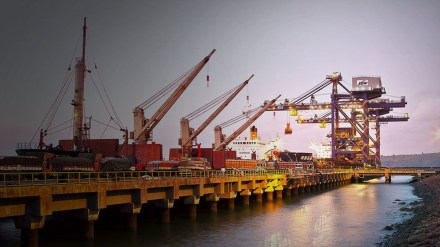JSW Ports, a wholly-owned subsidiary of Sajjan Jindal-led JSW Infrastructure, has retired high-cost rupee debt of Rs 862 crore to a consortium of banks.
“This was done largely from our internal accruals, as our ports business has been doing very well for the last two-three years, and supported by our recent bond issue. Thereby, we have reduced borrowing costs substantially,” Lalit Singhvi, chief financial officer at JSW Infrastructure, told FE during an interaction.
The consortium of banks comprised Axis Bank, Canara Bank, South Indian Bank, Union Bank of India and Bank of India.
In January, JSW Infrastructure raised funds through a debut $400 million sustainability-linked bond issue. This was used to refinance its high-cost debt exposure from the Indian banking consortium.
Also Read: Govt doubles paid-up capital limit of ‘small companies’
“The net debt at a group level will fall to Rs 2,600-2,700 crore by the end of this financial year. Further, we will be generating about Rs 1,000 crore of free cash flow every year now, and from that angle if we don’t incur more capex in the next two-three years, we would emerge as a debt-free company,” Singhvi said.
The company’s debt to equity ratio for FY22 was 0.97, which is expected to fall to about 0.63 in the current financial year.
JSW Ports, which operates private commercial ports at Jaigarh and Dharamtar in Maharashtra, has also completed investing Rs 4,000 crore over the last five years. The funding was used to increase the company’s total cargo handling capacity to 153 MTPA as of FY22-end from 45 MTPA in FY17. The capacity was increased across its commercial ports and terminals at Paradip, Mangalore and Ennore.
JSW Infrastructure had earlier invested about Rs 1,300 crore to set up a fully mechanised terminal at Paradip Port Trust in Odisha, which commenced operations in May.
“The capacity utilisation at the ports will rise to 60% this year from 45% last year and is slated to rise further. Out of the total Rs 4,000 crore, we have already repaid more than Rs 2,800 crore,” he said.
The company is also shipping third-party cargo — including sugar, fertiliser, molasses, bauxite and edible oil — from Dharamtar port. “Our third-party business is also rising, which has now risen to 30% from the overall 5% we had nearly three years ago,” Singhvi said.
